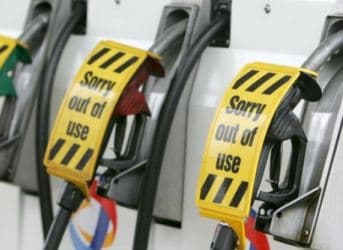The U.S. new sanctions initiative, strongly supported by Israel, to impose new sanctions against Iran, is designed to punish it for its purported covert nuclear weapons program by imposing new restrictions on Tehran.
As a result, many of Iran’s oil customers are scrambling to avoid collateral damage to their economies.
The sanctions’ potential fallout is now hitting South Africa, Africa's biggest economy, which receives nearly 25 percent of its needs from Iran, roughly 98,000 barrels per day (bpd), or about 4 percent of Iran’s total exports.
South Africa's economy, which has been hit by fuel shortages in the past because of strikes and refinery problems, would be hard-pressed to fill any gap quickly.
South Africa's Department of Energy director general Nelisiwe Magubane said that South Africa had not yet received any formal request from the United States to halt or reduce Iranian crude imports following a visit to South Africa last week by a senior U.S. energy official but added that, as most South African refineries are designed to treat Iranian crude and that any adjustment to handle other crudes would involve a financial cost, telling reporters, "We have said let's work on a worst case scenario. In other words, let's just assume that we cannot get anything out of Iran or at a reduced rate, what is going to be the impact?"
According to the U.S. Energy Information Administration (EIA), South Africa is Iran’s ninth largest export market, after China (543,000 bpd), India (341,000 bpd) Japan (251,000 bpd, South Korea (239,000 bpd), Turkey (217,000 bpd), Italy (204,000 bbd), Spain (170,000 bpd) and Greece (158,000 bpd.)
Within these figures however is the issue of how much Iranian crude represents in terms of a country’s total percent of imports, and South Africa is only exceeded by Greece (53.1 percent) and Turkey (30.6 percent).
The U.S. administration has been assiduously involved in discussions to shield nations that sign on-board for increased sanctions to obviate the effects on them. Last week U.S. Deputy Secretary of Energy Daniel Poneman said during his visit to South Africa that Washington had been in talks with all oil importers to find alternatives to Iranian supply and would work to avoid price rises.
U.S. South African embassy spokesman Elizabeth Trudeau told journalists, "We ... are working with oil consuming countries to help them respond to the new legislation and find alternatives to energy supplies from Iran." Regarding the U.S. presence in South Africa Trudeau added that a representative of the U.S. Treasury was in Pretoria, commenting, "The Treasury official met representatives of private business in South Africa, including members of the banking industry, as well as officials from the South African government," adding that the meetings were “part of our ongoing dialogue with countries around the world on the implications and implementation of the sanctions legislation.”
However, even if South African refineries could locate alternative sources of crude oil, it would involve a substantial cost to them, which, according to South African Department of Energy Director General Nelisiwe Magubane, are designed to process lighter grades of oil, such as those from Iran. Magubane estimated that the cost to alter South African refineries to utilize other grades of crude would exceed $44 million.
South African-Iranian ties have a long, deep and complex history. During South Africa’s white apartheid regime Iran supported the African National Congress resistance when it was an anti-apartheid movement, but Tehran played both sides of the fence, as it also supplied oil to the white minority government both before and after the Shah’s overthrow by the Islamic regime led by Ayatollah Ruhollah Khomeini in February 1979.
History aside, South Africa could provide a unique opportunity for settling the Iranian nuclear debate, should the UN Security Council decide to avail itself of Pretoria’s services.
South Africa is the only nation in the world to have voluntarily surrendered an incipient nuclear weapons program and now maintains that all countries should have the right to develop peaceful nuclear energy. South Africa has both uranium reserves and its own civilian nuclear power program. Seeking to build on its twin heritage of civilian and military nuclear endeavors, last week South African Foreign Affairs department spokesman Clayson Monyela said that South Africa has informed Iran that it is ready to help any nation that wants to follow its lead and give up nuclear weapons.
It is a concept worth pursuing as an alternative to war, as all five members of the UN Security Council possess nuclear arsenals as well as civilian nuclear programs. Perhaps the UN Security Council should consider listening to the advice of a nation that produced a Nobel Peace Prize winner rather than dictating.
ADVERTISEMENT
And South Africa? Quite aside from the diplomatic laurels it would gather, it would save the funds needed to retool its refineries.
A win-win situation.
By. John C.K. Daly of Oilprice.com


















